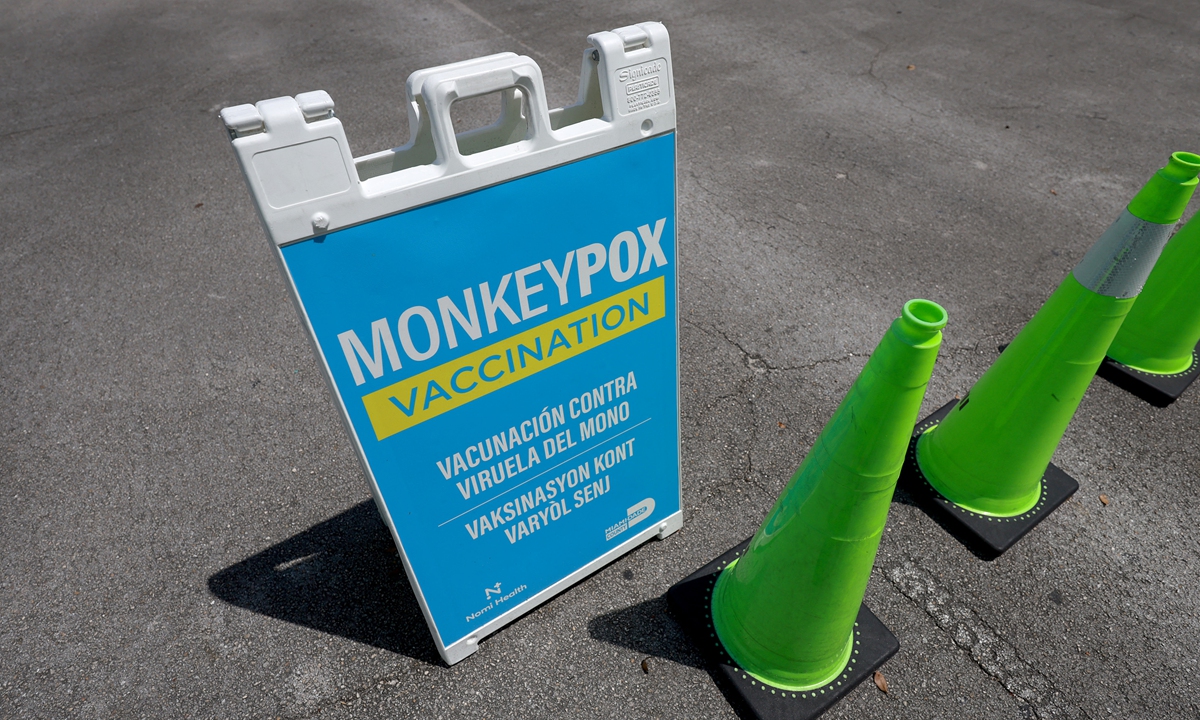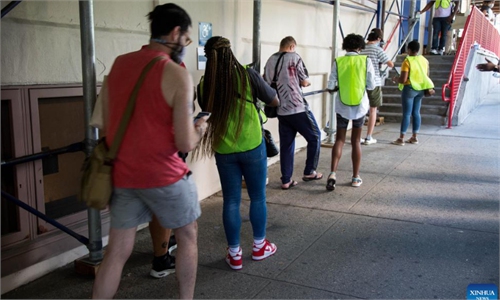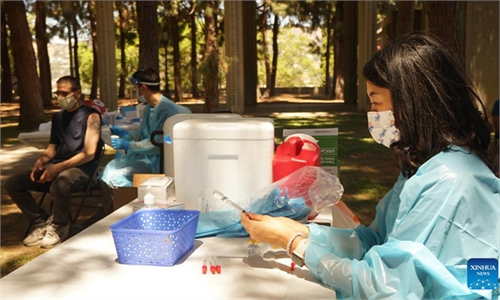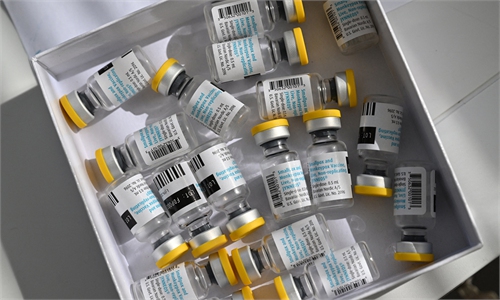
A sign announcing monkeypox vaccination is setup in Tropical Park by Miami-Dade County and Nomi Health on August 15, 2022 in Miami, Florida. Photo: AFP
Testing delays, vaccine shortages, mounting misinformation... Make no mistake, these are not news headlines of 2020, but of 2022, when the US has had yet another faltering response to an infectious disease, nearly three years after the outbreak of the still-ongoing COVID-19 pandemic.As of August 31, 2022, monkeypox cases have reached 51,257 worldwide, among which 18,989, or 37 percent, were reported by the US. The virus reached the US in mid-May and then spread to all of its 50 states on August 22. Prior to that, on August 4, the Joe Biden administration declared a national health emergency. It is America's fifth such national emergency since 2001, and was declared as the country remains in a state of emergency over COVID. Just a few days ago, the US reported its first monkeypox death.
Unlike the coronavirus, monkeypox, originally endemic to Central and Western Africa, is a known pathogen that has been researched and studied extensively. It is less transmissible, spreading primarily through close, physical contact; and it is rarely fatal. More importantly, there are existing tests, vaccines and treatment for the disease.
As such, monkeypox seems to have been a much less formidable challenge that the US - the best-equipped country on Earth in terms of medical and pharmaceutical resources and capabilities - should have handled rather well. And yet, the last few months seem to be a tragic replay of 2020.
Limited testing capacity, flawed data collection, bureaucratic delays, vaccine supply shortages and inefficient management, and poor communication with the public: deja vu-like parallels between America's response to monkeypox and COVID reveal that the US is repeating nearly every mistake it made two years ago.
These disturbing echoes make many wonder: Has America ever learned its lesson? Two and a half years into the COVID-19 pandemic, the US has registered nearly 95 million infections - equivalent to almost one-third of its population, and over 1 million deaths. One would think that the lesson is hard and painful enough that the US post-COVID would be better prepared for the next epidemic. However, the grim reality is that the US, stuck in a pattern of neglect and panic as The Washington Post noted, stumbles again in its response to monkeypox.
A dysfunctional democracy and failing social governance are the underlying causes of America's disastrous mishandling of health emergencies. This is the essential lesson to be learned.
For many years, Democrats and Republicans have been weaponizing and politicizing public health issues for partisan wins, leaving an underfunded, understaffed and ill-prepared public health system to deal with the numerous challenges in a new age of pandemics. As a result, the partisan divide grows wider on issues from Congress appropriations to mask and vaccine mandates. Such polarization has often pushed the US government into a state of paralysis by indecision, hence the slow and bureaucratic response it has had in the face of both COVID and monkeypox.
American-style democracy frequently morphs into a "vetocracy" driven by partisanship and vested interests instead of the life and health of the people. The checks and balances system, designed to prevent abuse of power, raises the cost of collective action and in many cases renders it utterly impossible to build consensus. It leaves partisan wrangling unchecked and produces antagonism rather than balance.
US federalism, an arrangement of dividing power between state governments and the federal government, has created a badly fragmented political structure that is fraught with inconsistent policy implementation, divergent standards, incoherent messaging and endless blame game. During both COVID and monkeypox outbreaks, the world has seen in the US a patchwork of cities, counties, states and federal agencies mired in fierce controversies over almost every measure to be taken to control viral spread. The country breaks into a checkerboard of jurisdictions fighting a war of all against all for diagnostic tests, supplies and therapeutics.
America's messy epidemic response has also aggravated racial discrimination, an entrenched problem that has plagued the US for centuries. Just like COVID, monkeypox is disproportionately affecting ethnic minorities in the US. The CDC's statistics on August 14 show that black and Hispanic people, who together make up around 31 percent of America's total population, account respectively for 33.2 percent and 31.8 percent of monkeypox cases in the US. Vaccination is also marked with the same racial disparities, as the CDC points out recently that only about 10 percent of monkeypox vaccine doses have been given to black people, even though they account for one-third of the cases.
A government - any government - is morally and legally obliged to protect its citizens from harm, whatever their color, since the rights to life and health are basic human rights that every human being is entitled to. Failing to do so constitutes a violation of human rights, an accusation often leveled by US politicians at other countries. Yet, it is the same US politicians who have chosen to ignore the calamities inflicted on the American public and put politics above issues of vital importance to the people's life and health.
The hypocrisy cannot be more evident, and the irony is striking. The US, the "shining city on a hill" and "beacon of democracy," has done a worse job than most other countries in protecting its people from dangerous viruses. The self-styled "human rights champion" now leads the world in both COVID cases and deaths and monkeypox infections. It is time that the US learn its lesson and make meaningful changes. The over 300 million American people deserve no less.
The author is a current affairs commentator based in Beijing. opinion@globaltimes.com.cn



